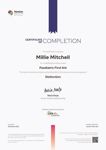Well Intervention Techniques for Effective Petroleum Engineering
Accredited By CPD | High-quality Materials | Video Lessons | Lifetime Access | 24/7 Tutor Support
NextGen Learning
Summary
- Exam(s) / assessment(s) is included in price
- Tutor is available to students
Add to basket or enquire
Overview
Petroleum engineers play a vital role in the exploration, production, and refinement of oil and gas resources. With this course, you will gain a comprehensive understanding of the principles, practices, and technologies that underpin the field of petroleum engineering.
Learning outcomes:
- Understand the fundamentals of petroleum geology and exploration
- Analyse reservoir rock and fluid properties for efficient resource extraction
- Apply reservoir engineering principles to oil and gas reservoirs
- Evaluate drilling contracts and rig crews for successful operations
- Implement well intervention techniques to optimize production
- Evaluate the environmental impact of petroleum engineering and explore the future of energy.
CPD
Course media
Description
In the Petroleum engineering course, you will delve into the world of petroleum engineering and exploration, covering the entire spectrum of topics, from geological formations and reservoir properties to drilling rigs and production processes. You will learn how to analyse and interpret geological data, evaluate reservoir properties, and design production processes that maximize resource extraction. Additionally, you will learn about the impact of petroleum engineering on the environment and explore the future of energy.
This course is ideal for anyone interested in the field of petroleum engineering, including students, professionals, and enthusiasts. It is especially beneficial for those seeking to gain a theoretical understanding of petroleum engineering principles, without any practical experience.
Certification
Upon completion of the course, learners can obtain a certificate as proof of their achievement. You can receive a £4.99 PDF Certificate sent via email, a £9.99 Printed Hardcopy Certificate for delivery in the UK, or a £19.99 Printed Hardcopy Certificate for international delivery. Each option depends on individual preferences and locations.
Who is this course for?
- Individuals seeking to learn the fundamentals of petroleum engineering and exploration.
- Students pursuing a degree in petroleum engineering or related fields.
- Professionals in the energy sector looking to expand their knowledge and skills.
- Anyone interested in understanding the technical, environmental, and economic aspects of petroleum engineering.
Career path
- Junior Petroleum Engineer (£26,000 - £35,000 per annum)
- Petroleum Engineer (£35,000 - £60,000 per annum)
- Senior Petroleum Engineer (£60,000 - £100,000 per annum)
- Reservoir Engineer (£35,000 - £80,000 per annum)
- Drilling Engineer (£35,000 - £70,000 per annum)
- Petroleum Geologist (£30,000 - £60,000 per annum)
Questions and answers
Currently there are no Q&As for this course. Be the first to ask a question.
Reviews
Currently there are no reviews for this course. Be the first to leave a review.
Legal information
This course is advertised on reed.co.uk by the Course Provider, whose terms and conditions apply. Purchases are made directly from the Course Provider, and as such, content and materials are supplied by the Course Provider directly. Reed is acting as agent and not reseller in relation to this course. Reed's only responsibility is to facilitate your payment for the course. It is your responsibility to review and agree to the Course Provider's terms and conditions and satisfy yourself as to the suitability of the course you intend to purchase. Reed will not have any responsibility for the content of the course and/or associated materials.




